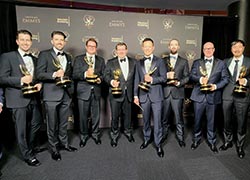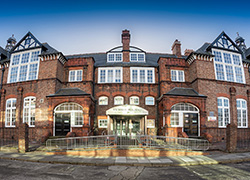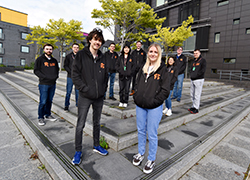Course overview
Foundation year Work placement
Animex 2024
Animex 2024 round-up, our international festival of animation, VFX and games.
Develop your understanding of design and programming to build creative solutions to production challenges.
You plan and develop 2D and 3D games in a number of game engines, giving you the skills to enter a broad range of careers ranging from programming to level design.
You also take part in a wide variety of game jams, hackathons, and industry networking events. You can also apply to our on campus Launchpad accelerator programme to develop your own independent game.
Top reasons to study this course at Teesside:
- Industry links: take part in Animex, our annual international animation and games festival featuring experts from Rockstar, Pixar, Disney and Sony.
- Real-world experience: enter GameJam events, take part in industry competitions and Beta test upcoming games before they are released.
- Career-ready: our ExpoSeries of events allow you to showcase your skills to industry professionals who are seeking to recruit new and rising talent.
- Start-up business support: we support you to develop your own business in games through our innovative Power UP Indie Games Accelerator.
- Quality teaching: 92.4% of computer games and animation students agreed that staff often made the subject engaging (National Student Survey 2024, tees.ac.uk/source).
Course details
Course structure
Year 1 core modules
Gain the skills you need for game creation using a contemporary game engine. Understand the fundamentals of modern game development, including scripting, asset creation and level design.
This is a 30-credit module.
Learn how to write computer programs with a focus on games-related applications. You consider common programming constructs that apply to multiple object-oriented programming languages such C++, Java, C#. You then focus on the games industry-standard C++ language.
This is a 30-credit module.
You apply core scripting concepts and ideas to solve practical development problems and build gameplay elements in a modern game engine. Explore programming patterns and paradigms to develop efficient and functional code for games.
This is a 30-credit module.
You work on an individual artefact related to a game experience using a brief set by industry. Develop your experience of working with a real production brief, targeting specific production skills within your own field of study.
This is a 30-credit module.
Year 2 core modules
Games Business, Marketing and Publishing
You focus on the business, marketing and publishing aspects of the games industry, examining new trends and business models for games development. Look at the process for turning a digital concept into an attractive business proposal to acquire funding and investment, and explore how marketing, publishing and distribution get a game to market.
This is a 30-credit module.
You work with students from across all the games courses to develop a game slice in a team. Experience working in a production environment, and focus on specific skills in your own field of study while gaining valuable teamwork skills.
This is a 30-credit module.
You focus on the low-level scripting available in modern game engines. Create your own custom functionality by programming algorithms, functions and classes at an engine level.
This is a 30-credit module.
Enhance your knowledge of technical game design and development, identifying opportunities in production and gameplay experiences. Advance your scripting skills to produce original game features and extend a given prototype.
This is a 30-credit module.
Optional work placement year
You have the option to spend one year in industry learning and developing your skills. We encourage and support you with applying for a placement, job hunting and networking.
You gain experience favoured by graduate recruiters and develop your technical skillset. You also obtain the transferable skills required in any professional environment, including communication, negotiation, teamwork, leadership, organisation, confidence, self-reliance, problem-solving, being able to work under pressure, and commercial awareness.
Many employers view a placement as a year-long interview, therefore placements are increasingly becoming an essential part of an organisation's pre-selection strategy in their graduate recruitment process. Benefits include:
· improved job prospects
· enhanced employment skills and improved career progression opportunities
· a higher starting salary than your full-time counterparts
· a better degree classification
· a richer CV
· a year's salary before completing your degree
· experience of workplace culture
· the opportunity to design and base your final-year project within a working environment.
If you are unable to secure a work placement with an employer, then you simply continue on a course without the work placement.
Final-year core modules
Advanced Development Techniques
Extend your knowledge of modern development techniques and principles commonly used within the games industry. Undertake research into modern design principles and create a small proof of concept, using that research as a basis.
This is a 30-credit module.
Experience working as a member of a games development team, in a setup that is as close to industrial practice as possible. You work in groups to construct a working game demo in a current game engine. You consider standard industry practices that consider multiplayer gaming threats, user safety, cheating and data security.
This is a 30-credit module.
You undertake a large-scale project guided by a member of staff, where you produce a substantial piece of work related to your course alongside a written report. You also present and discuss your project.
This is a 60-credit module.
Modules offered may vary.
How you learn
Lectures provide you with specific theoretical information related to the subject, while accompanying tutorials focus on developing practical skills and working toward the assessments. Tutorial sessions are also used for feedback and advice from tutors. Further support is offered online in the form of extra learning material including video tutorials
How you are assessed
You learn by doing and are mainly assessed through practical projects, which you work on throughout the semester. You develop a portfolio of work throughout the course which is a key requirement of the industry.
Throughout the course you are challenged with demonstrating game development skills that are directly related to the topical needs of the job market. The year 2 Journeyman module and final year Beta Arcade modules are shared across all our games courses and provide you with essential teamwork skills ready for industry. The Project in the final year allows you the freedom to study set your own project based on your skills, interests, and career aspirations.
Our Disability Services team provide an inclusive and empowering learning environment and have specialist staff to support disabled students access any additional tailored resources needed. If you have a specific learning difficulty, mental health condition, autism, sensory impairment, chronic health condition or any other disability please contact a Disability Services as early as possible.
Find out more about our disability services
Find out more about financial support
Find out more about our course related costs
Entry requirements
Entry requirements
96-112 UCAS points from any combination of recognised Level 3 qualifications
We may also be able to help you meet the entry requirements through our Summer and Winter University modules.
For general information please see our overview of entry requirements.
International applicants can find out what qualifications they need by visiting Your Country.
You can gain considerable knowledge from work, volunteering and life. Under recognition of prior learning (RPL) you may be awarded credit for this which can be credited towards the course you want to study.
Find out more about RPL
Employability
Career opportunities
This course provides you with a range of technical and design skills, making you the perfect candidate for a career as an independent games developer.
Entrepreneurial support from University-based Launchpad helps you to start your career as an independent developer or small company. Many small studios now take advantage of Kickstarter funding to generate the funds to develop their games. As a graduate of this course, you have the skills to put forward a polished proof of concept to attract funding.
As the course provides a range of transferable skills in real-time environments such as Unity and Unreal, you are also well suited for careers in virtual reality or real-time visualisation and interactive experiences.
Information for international applicants
Qualifications
International applicants - find out what qualifications you need by selecting your country below.
Select your country:
Useful information
Visit our international pages for useful information for non-UK students and applicants.

 Emmy success for Teesside University graduate
Emmy success for Teesside University graduate Indie games studios to attend prestigious conference
Indie games studios to attend prestigious conference Leading games studio helping students gain industry experience
Leading games studio helping students gain industry experience